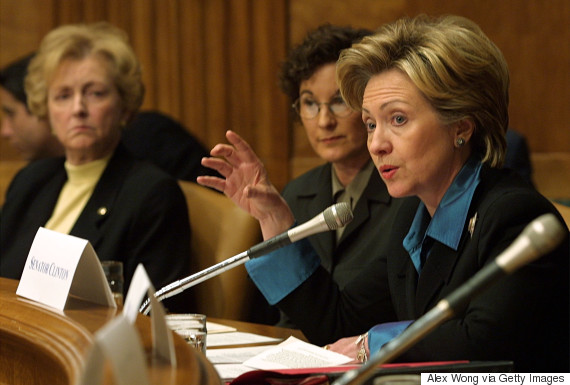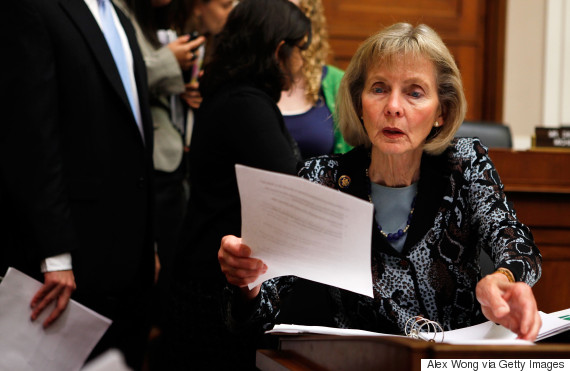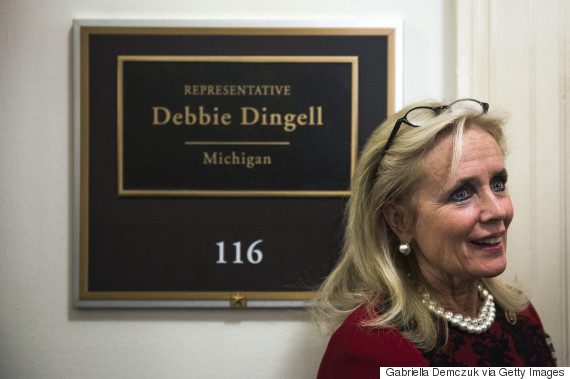
Photo credit: J. DAVID AKE/AFP/Getty Images
WASHINGTON -- The dream of electing the first female president is one of Hillary Clinton's most powerful selling points. She wants, as she said in her kickoff speech, America to be a place "where a father can tell his daughter, 'Yes, you can be anything you want to be. Even president of the United States.'"
At the same time, Americans say they're tired of famous families dominating the political system, and Clinton continues to battle charges that she's not fresh and new enough because she's part of a political dynasty started by her husband, former President Bill Clinton.
But without dynasties -- particularly wives following their husbands into office -- there would be far fewer women in politics. It's the way many women entered Congress and obtained political power in the United States and internationally. And it's potentially how a woman will occupy the Oval Office for the first time.
"We are beginning to have a climate where it's comfortable to ask a woman to run," said Rep. Lois Capps (D-Calif.), who succeeded her husband in Congress in 1998. "And we've not had that in the past. I think we've been overlooked."
****
The Widow's Mandate
Capps' experience is typical: Until the 1970s, one of the most common ways for a woman to enter politics was by following her husband. According to Pew Research Center, 90 women served in the House between 1916 and 1980; 34 of them were elected to fill their husband's seat or replaced him on the ballot after he died. This practice became so common that it had its own term: the "widow's mandate" or "widow's succession."
Male party leaders expected these women to quietly carry on their husband's legacy until the party could find a permanent male successor.
In total, 47 women have been elected or appointed to fill a congressional vacancy created by their husband's death, according to the Center for Women and Politics.
Although some served only briefly, a number of them -- Lindy Boggs, Cardiss Collins and Margaret Chase Smith, for example -- went on to have long, distinguished careers in Congress. Smith, a Republican from Maine, was elected to the Senate in 1948, although she first served in the House after taking over for her deceased husband. Even female voters were skeptical of female politicians during Smith's time. During her Senate campaign, an opponent's wife asked, "Why [send] a woman to Washington when you can get a man?"
It wasn't until 1978 that Nancy Landon Kassebaum, a Republican from Kansas, became the first woman elected to a full term in the Senate without taking the place of her husband.
Former Sen. Jean Carnahan (D-Mo.) said she didn't seriously consider public office growing up. It just wasn't something women were expected to pursue.
"I grew up in Washington, D.C.," she said. "So I was around the Capitol and everything. When I was a high school student, I worked one summer in the Capitol for the congressman from Hawaii. I had a lot of friends who had worked up on the Hill, but I had never thought of me running for that."

Sen. Jean Carnahan (D-Mo.), left, at a policy forum with Sen. Hillary Clinton (D-N.Y.), hosted by the National Center for Policy Research March 15, 2001, in Washington, D.C.
Carnahan eventually made it back to the Capitol -- as a senator. Her husband, Mel, died during his campaign in 2000, just weeks before Election Day. After he was posthumously elected, Missouri's governor appointed Carnahan to take his place. She lost a 2002 special election, which kept her from serving the full six-year term.
Capps took office in 1998, winning a special election for the seat that had been occupied by her husband, Walter, who passed away just months into his term in Congress. Like Carnahan, Capps said she never even considered running for office while growing up in Wisconsin.
"No," she said when asked whether she received any encouragement from people to think about running. "Never, never, never."

Rep. Lois Capps (D-Calif.) is retiring at the end of this Congress.
Research shows the idea that politics is a business for men is a major reason so few women obtain elected office. In other words, women often don't run simply because they aren't encouraged to do so.
In 2013, Jennifer Lawless of American University and Richard Fox of Loyola Marymount University surveyed more than 2,100 college students between the ages of 18 and 25. The women in that group were less likely than the men to have ever considered running for office. The men were more likely to be encouraged to consider politics as a career path and to be exposed to political information. They were also more likely to think of themselves as qualified to run for office.
Internationally, family connections have also broken down barriers for women in politics. As in earlier times in the United States, these women were expected to stand in for their male relatives.
The world's first female prime minister, Ceylon's Sirimavo Bandaranaike, took over after her husband was assassinated in office. Pakistan's Benazir Bhutto and India's Indira Gandhi often invoked their departed fathers' legacies while campaigning.
****
Hillary's Turn
The fact that many women first achieved office by succeeding their spouses doesn't mean those women were unqualified for their posts.
"Hillary Clinton and I are very much people in our own rights -- before we married our spouses," said Rep. Debbie Dingell (D-Mich.), who ran for her husband's seat after he stepped down in 2014.
Carnahan said she worked right alongside her husband during his campaigns, although her contributions were largely behind the scenes.
"We had always run together in campaigns, for everything he ever ran for," Carnahan said. "I wrote his speeches, I ran the office, I'm his [partner] behind the scenes. So I felt like it was right for me to go on."
No one would accuse Clinton of being unqualified to be president. She was politically active long before she met Bill, and she also established her own legal career. After her time as first lady, she became New York's first female U.S. senator and later served as secretary of state in President Barack Obama's administration.
At the same time, it's undeniable that Clinton benefited from being a political spouse.
"You can't possibly not acknowledge that there are tremendous benefits that she has reaped by being the wife of [Bill Clinton]. The visibility, the name recognition, the contacts, the ability to raise the money," said Debbie Walsh, who is the director of the Center for American Women and Politics at Rutgers University and conducts research on the ways women enter politics.
"But their [relationship] was a partnership," she added.

Hillary Rodham Clinton, wife of Democratic presidential hopeful Gov. Bill Clinton of Arkansas, and their daughter Chelsea applaud as the governor announces his intention to run for president, Oct. 3, 1991, in Little Rock.
Clinton, like so many other political women, did not have the variety of paths her husband had to go into public office. When Bill became governor of Arkansas in 1979, there had been only five female governors in the history of the United States. More often women did what Clinton did: She packed her bags and moved to Arkansas to support her husband's career.
"It makes sense that Hillary would have had to wait, that Hillary would have had to come in second," said Pamela Paxton, who co-authored the book Women, Politics and Power. "She can run, but it's after Bill. And that absolutely is a product of the fact that there were few women in Congress and there were few women in governorships."
"She put her political career on hold for his political career," said Walsh, saying Clinton made what was the "more typical choice" at the time.
"She was, in many ways -- we talk about this in academia -- the trailing spouse," she added.
Clinton's decision didn't please all of her friends, who recognized her talents and her political promise.
Sara Ehrman, a friend of Clinton's since the 1970s, told The Washington Post recently that she desperately tried to talk Clinton out of joining her husband in Arkansas.
"Are you crazy?” she said she asked Clinton at one point. Ehrman said she cried, convinced her friend was throwing away her professional future.

Arkansas Gov. Bill Clinton, second left, and his wife Hillary are seen talking with U.S. Ambassador to Belgium Geoffrey Swaebe, left, and Illinois Gov. James R. Thompson, right, during a reception in Brussels, Belgium, Sept. 30, 1987.
In 1994, New Yorker writer Connie Bruck wrote that a friend of Clinton's remembered her commenting in the 1980s, "Someone from my youth group called and said, ‘It’s great that you’re a governor’s wife -- but we thought you would be governor.'"
Betsey Wright, another longtime friend of the Clintons who eventually served as Bill's chief of staff when he was governor, told Bruck that at the time, she had been disappointed by Clinton's decision to prioritize her husband's career.
"I’m almost a student of strong women leaders," Wright said. "And she was so unusual, even in that cadre."
But, Wright said Clinton realized she could be stronger politically if she combined her career with his.
"I’m not saying that’s why she married him -- but it was something she saw," Wright added. "And she’s always seen she could have political power with him -- just not elected. It was my shortsightedness that I felt when she married him that she was giving up her chance for political power."
Clinton eventually pursued political office in 2000, making a successful bid for New York's open Senate seat. But then, she worried that she'd face an uphill battle because of some of her past personal choices.
In her 2003 autobiography, Living History, Clinton said she expected some Democratic women would be tough to win over, "particularly professional women my age who normally would be my natural base but were skeptical of my motives and my decision to stay married to Bill."
"My dilemma was unique," she wrote. "Some worried that Bill was still so popular in New York and such a towering political figure in America that I would never be able to establish an independent political voice. Others thought the controversy attached to him would overwhelm my message."
She also wasn't sure what her husband's role would be on the trail.
"Logistical considerations relating to 'my spouse' were tricky. If I were to announce my candidacy at a kick-off event, would the President of the United States sit quietly behind me on the stage, or would he speak too?" she wondered.
****
Generational Change
The widow's path to politics is becoming far less common as opportunities for women to get elected increase. Capps has announced she will step down after this term, leaving Rep. Doris Matsui (D-Calif.) as the only woman in Congress who succeeded her late husband.
That doesn't mean dynasties will disappear; politics, after all, has often been a family business.
"Generationally what you may in fact see is more women who have been married to a political person who is then running for office," Walsh said, pointing to Clinton as an example. "They're not just married to the political person, but they have a political career of some kind of their own, and political aspirations of their own that I think we might not have seen as much in earlier years."
Dingell is part of this new wave. She is co-chair of Women Lead, a Democratic Congressional Campaign Committee project to elect more women to Congress.
In 2014, she became the first woman elected to take over her husband's seat in Congress while he's still alive. Dingell was politically active long before she married her husband -- she actually was a Republican before they met -- and had a career in the auto industry before running for office.

Rep. Debbie Dingell (D-Mich.) won her seat in a 2014 election.
During a recent interview with The Huffington Post, Dingell repeatedly stressed that she should be judged on her own merits.
"I'm going to be Debbie Dingell. I'm not trying to be John Dingell. And I've said that to everybody," she said. "I'm Debbie Dingell. And by the way, Debbie Dingell very much has her own identity -- I'm pretty known for saying what I think. So I'm not trying to be a second John Dingell. I'm going to be me. And that's what I've made clear to everybody. And I am fighting in my own voice."
She said women need to start building a network -- "the way that the boys have had the boys' network for a very long time" -- in order to gain more political power. And, she added, they have to make sure they support each another.
"There are women who feel threatened by other women in politics and aren't as supportive as they could be," Dingell said. "I think we are making progress, but we have not yet made enough progress."
Capps said there also needs to be more emphasis on creating policies that support women in the workplace, such as flexible work schedules and affordable child care.
"This is my basic bottom line here: Supporting women in the workplace is going to lead to more women in elected office," she said.
And around the world, with an increased awareness about the need for women in politics, the old system is slowly breaking down.
"If you look at the 54 women that we've had that are powerful prime ministers or presidents around the world, the percent that have had some connection to a husband or father is declining precipitously," Paxton said.
"The number of women who are in Congress now because they filled their husband's seat is quite small compared to what it was 60 years ago, when that was almost the only path to office," Walsh added.
Many female politicians believe that if Clinton wins in 2016, there could be a ripple effect.
"I think she would inspire more women to think about [running for office]," Dingell said.
Capps called the potential fallout from a Clinton presidency "tremendous."
"The ultimate glass ceiling, isn't it?" she said.
And maybe, as Clinton said, America will soon be a place where a father will be able to tell his daughter that she can be anything, even president of the United States. It also might be a place where he can assure her she won't have to wait for her husband to run first.
Want more updates from Amanda? Sign up for her newsletter, Piping Hot Truth.
